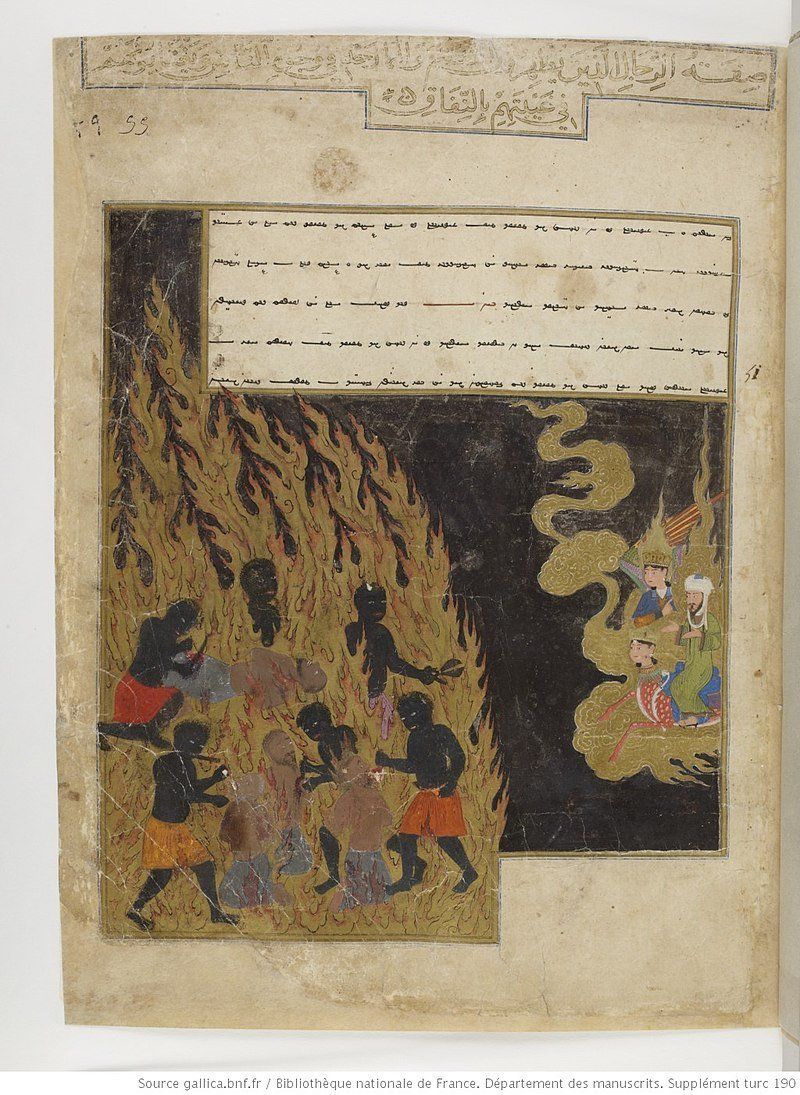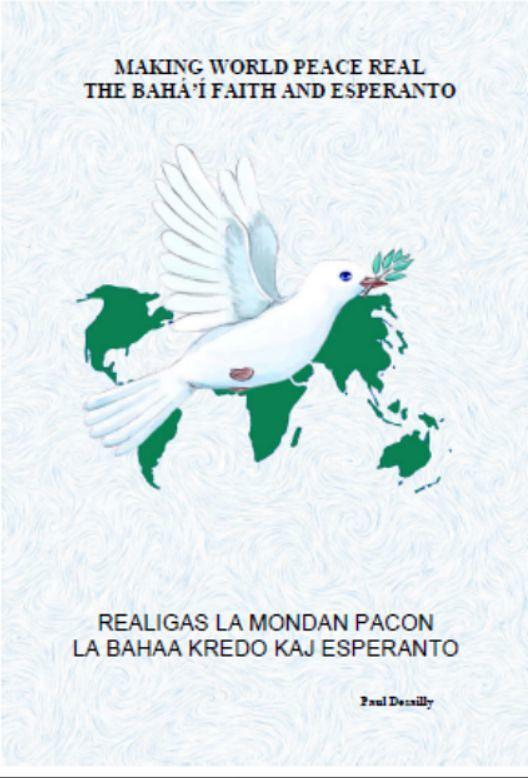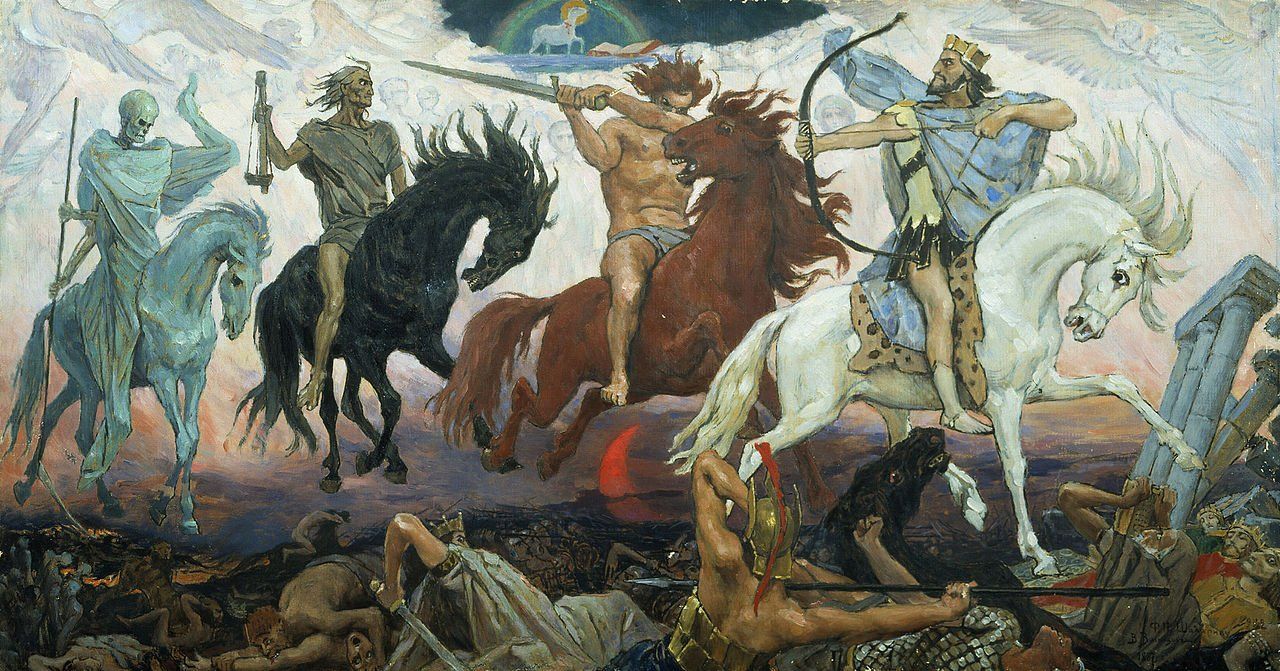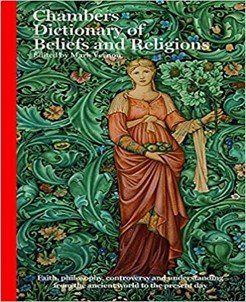APOCALYPSE AND POST APOCALYPSE — PART TWO
APOKALIPSO KAJ POST APOKALIPSO — PARTO DU
APOCALYPSE AND POST APOCALYPSE — PART TWO
Apokalipsaj Prognozoj kaj Koincidoj Apocalyptic Prophesies and Coincidences P Desailly
Por la plej prestiĝaj leksikografoj de Usono, d-ro Mark Vernon, kiu estas psikoterapiisto kaj iama pastro de la anglikana eklezio, estas verkinta spertegan kompilaĵon pri kompara religio: https://www.amazon.com/Chambers-Dictionary-Beliefs-Religions-Vernon/dp/0550103449 Ke la fama Chamber’s Dictionary of Beliefs and Religions estas eldonita de Hachette, la unua eldonejo de D-ro Zamenhof, nur plibonigas sian allogon. Koneksoj inter la bahaa kredo kaj la Esperanto-movado de doktoro Vernon reliefigitaj sur paĝoj 2, 66, 67, 192 kaj 570 karakterizas (1) la bazon de mia parolado (2) diferencojn inter bahaismo kaj aliaj mond-religioj kaj (3) unu konkludon de mia libro ĉe paĝo 74 en kiu mi prezentas kial malmultaj bahaanoj esperantistiĝas kaj kiel iu oficisto de la Universala Domo de Justeco reagis al Vernon: FROM BABEL TO BAHA’I (FB2B) https://gum.co/gDehr https://eo.wikipedia.org/wiki/Universala_Domo_de_Justeco
Mark Vernon Ph.D., who is a psychotherapist and former priest of the Anglican Church, has composed an expert compilation on comparative religion for the most prestigious lexicographers in the United States of America:
https://www.amazon.com/Chambers-Dictionary-Beliefs-Religions-Vernon/dp/0550103449
That the renowned Chamber’s Dictionary of Beliefs and Religions is published by Hachette, Dr. Zamenhof’s first publisher, only enhances its appeal. Commonalities between the Baha’i Faith and the Esperanto movement highlighted by Dr. Vernon on pages 2, 66, 67, 192 and 570 characterize (1) the basis of my presentation (2) differences between the Baha’i world faith and other major religions and (3) a conclusion in my book (p74) which details why few Baha’is are Esperantists and how one functionary at the Universal House of Justice reacted to Vernon’s courageous observations:
https://gum.co/gDehr
Kondiĉe ke bahaaj redaktoroj en Usono ne plu intervenos por misinterpreti, kaj eĉ sekrete aliigi, bahaajn tekstojn (FB2B p. 64 - 65) kaj ke oni zorge kaj sendepende enketos pri la vero por si mem, nepre surprizos vin kiom da oficialaj bahaaj tekstoj rekomendas Esperanton al bahaanoj. Grup-pensado: Ke la plejmulto el la bahaaj estroj simple ignoras aŭ ne legas la koncernajn dokumentojn konsistigas gravan problemon sed nur portempan ĉar por la unua fojo en la historio de la mondaj religioj la tuta instrukciaro kaj aro da konsiloj de la Fondinto legiĝas en ekzistantaj dokumentoj de Li mem verkitaj
Provided U.S. Baha’i editors desist from misinterpreting and secretly altering Baha’i texts (FB2B pp. 64 - 65) and that one carefully and independently investigates truth for oneself, it’s astounding how many official Baha’i writings recommend Esperanto to the Baha’is. Groupthink: That most Baha’i leaders don’t or won’t appraise the relevant documents is a big - but temporary - problem! For the first time in the history of world religions the Founder's instructions are easily accessible in original documents that He has penned.
Eble surprizas vin ĉeesti bahaan kunsidon en kiu elmontriĝas bildoj de religio de Ŝintoisma deveneneco. Kvin fojojn mi esperantumis en Japanio ĉar la Movado tie, samkiel en Oceanio, estas politike sendependa kaj eĉ pli forta ol la nia en Aŭstralio. Eble, ankaŭ vi, iam estis gasto de Oomoto? Kiajn impresojn havas vi pri religio kiu tre subtenas Esperanton? Por bahaanoj estas devige interamikiĝi kun sekvantoj de ĉiuj religioj. Bahaaj-Oomotaj koincidoj abundas multe pli ol tio, ke Oomoto fondiĝis en la jaro 1892. Bonvolu vidi paĝojn 2, 71, 77, 79, 80: https://www.yumpu.com/es/document/read/10266523/realigas-la-mondan-pacon-la-bahaa-kredo-kaj-esperanto
Are you surprised to attend a Baha’i session in which images of a religion of Shinto origin are exhibited? On five occasions I’ve sojourned among Esperantists in Japan because the Movement there, as in Oceania, is politically independent and even stronger than Australia’s. Maybe you too were once a guest of Oomoto? What are your impressions of a religion that strongly supports Esperanto? Baha’is are enjoined to befriend the followers of all religions! Baha’i-Oomoto coincidences abound way more than that the latter’s founding occurred in 1892: https://gumroad.com/l/making_world_peace_real/ pp. 2, 71, 77, 79, 80
Jen mia retadreso ĉar oni iafoje preferas private leteri al mi pri aferoj religiaj. Tiun sintenon mi tre respektas ĉar laŭ simila spirito mi ĉiam emfazas la neŭtralecon de UEA pri temoj politikaj kaj religiaj. http://aea.esperanto.org.au/ftp-uploads/ESK-134-mar2019.pdf p. 28. Tia neŭtraleco plaĉas al bahaanoj ĉar la fondinto de bahaismo, Baha’u’llah (prononcita BaHoLa) malpermesis al siaj sekvantoj membriĝi en politikaj partioj. Ni bahaanoj tute ne rajtas puŝi aŭ agreseme prozeliti por persvadi vin bahaaniĝi.
Here’s my e-mail address because people often prefer to write private letters vis-a-vis matters religious. I respect that attitude because in a similar spirit I always emphasize UEA's neutrality on political and religious issues: https://en.wikipedia.org/wiki/Universal_Esperanto_Association http://aea.esperanto.org.au/ftp-uploads/ESK-134-mar2019.pdf p. 28
Such neutrality pleases Baha’is because the founder, Baha'u'llah (pronounced BaHoLa), forbad partisan political engagement. Baha’is never push religion or proselytize in an aggressive fashion.
Ni tamen ne subtaksu la grandan kontribuon de filozofiaj kaj religiaj organizoj por sukcesigi iniciatojn de UEA. D-ro Zamenhof mem estis filozofo kies ĉefa tasko en la vivo, diris li ikonrompe, estas disvastigi Homaranismon. http://aea.esperanto.org.au/ftp-uploads/ESK-131-jun2018.pdf p. 23 - 25. Ofte surprizas esperantistojn konstati ke religianoj konsistigas 50% de la grupigitaj fak-membroj de UEA: http://aea.esperanto.org.au/ftp-uploads/ESK-134-mar2019.pdf p. 30.
Let’s not however underestimate the great contribution of philosophical and religious organizations in advancing initiatives of UEA. Dr. Zamenhof himself was a philosopher whose main task in life, he said iconoclastically, is spreading Homaranismo http://aea.esperanto.org.au/ftp-uploads/ESK-131-jun2018.pdf p.23-25. Esperantists are often surprised in that religious groups make up 50% of the grouped members of UEA.
Sed super ĉio, gekaraj, bahaa kunsido kutime komenciĝas per preĝo. Bonvolu do vortigi se vi volas la propran preĝon — aŭ kviete al vi mem aŭ publike en voĉo vasta — laŭ via plaĉo.
Ho mia Dio! Ho mia Dio! Unuigu la korojn de Viaj servantoj kaj malkaŝu al ili Vian grandan celon. Ili sekvu Viajn ordonojn kaj estu fidelaj al Via leĝo. Helpu ilin, ho Dio, en ilia penado kaj donu al ili forton por servi al Vi. Ho Dio! Ne lasu ilin solaj, sed gvidu iliajn paŝojn per la lumo de Via scio kaj ĝojigu iliajn korojn per Via amo. Vere, Vi estas ilia Helpanto kaj ilia Eternulo. Baha’u’llah.
Above all, a Baha'i session usually begins with a prayer or two. Please say your own prayer if you like – either quietly to yourself or in a clear voice for our gathering – as you prefer.
O my God! O my God! Unite the hearts of Thy servants,
and reveal to them Thy great purpose. May they follow Thy
commandments and abide in Thy law. Help them, O God,
in their endeavor, and grant them strength to serve Thee.
O God! Leave them not to themselves, but guide their steps
by the light of Thy knowledge, and cheer their hearts by
Thy love. Verily, Thou art their Helper and their Lord.
BAHA’U’LLAH
APOKALIPSAJ PROGNOZOJ KAJ KOINCIDOJ (3-parta, 60-minuta programero):
(1) koneksoj inter bahaismo kaj esperantismo: Lidia Z http://aea.esperanto.org.au/ftp-uploads/ESK-127-jun2017.pdf p. 16-17.
(2) diferencoj inter bahaismo kaj aliaj mond-religioj: http://aea.esperanto.org.au/ftp-uploads/ESK-130-mar2018.pdf p. 18 – 20.
(3) kial malmultaj bahaanoj esperantistiĝas: http://aea.esperanto.org.au/ftp-uploads/ESK-128-sep2017.pdf p. 21 – 24.
APOCALYPTIC PROGNOSES AND COMMONALITIES (60-minute, 3-part presentation):
(1) commonalities between the Baha’i Faith and Esperantism - FB2B; p. 5, 81 - 83 https://gum.co/gDehr
(2) what distinguishes the Baha’i Faith from other religions? - FB2B; p. 88 - 94 https://gum.co/gDehr
(3) why is only one Baha’i in 50,000 an Esperantist? - FB2B part 2; p.21 - 31 https://gumroad.com/l/TbtCp
Apokalipso estas greka vorto por signifi revelacion, ĉefe pri eventoj okazontaj. Kio do precize estas Apokalipso laŭ bahaa perspektivo kaj kiu ĝuste interpretas profetaĵojn, en ekzemple, la sankta Biblio? Abundas interpretoj de La Apokalipso de Johano kiu laŭ supraĵa esploro profetas katastrofojn. Sed, Manifestiĝo de Dio *, neniu alia, nek Nostradamo, nek Sankta Johano, kapablas klare deĉifri la verajn signifojn en facile kompreneblaj terminoj. Baha’u’llah, la Manifestiĝo de Dio por nia erao, jene verkis en ekzistanta dokumento arablingve revelaciita:
Apocalypse is a Greek word for revelation, mainly about future events. So, what exactly is the Apocalypse from a Bahá'í perspective and who inerrantly interprets prophecies in, for example, the holy Bible? Interpretations of and expounding on the Apocalypse of John, aka the Book of Revelation, that prima facie look catastrophic, require serious input from a Manifestation of God. * Neither St. John the Divine, nor Nostradamus, nor seers of our era, adequately decipher the cryptic meanings - in wording that we easily understand. Baha’u’llah has explained in an extant revelation penned in Arabic:
“La Tago de Juĝo kaj Fino de la Mondo estas terminoj komunaj al ĉiuj religioj. Kiam la homoj ne trovas la laŭvortan plenumadon de ekzemple Bibliaj profetaĵoj, ili deturnas sin de la nova Manifestiĝo de Dio kaj persekutas Lin. Ĉi tiuj frazoj rilatas al la tempoj, kiam la Manifestiĝoj de Dio efektive vivis sur la tero. En tiuj ĉi tempoj la malnova ordo ŝanĝiĝis kaj la plej multaj geviroj estis rezistemaj." (PROVIZORA ESPERANTIGO DE LA ANGLA TRADUKO FAR SHOGHI EFFENDI https://eo.wikipedia.org/wiki/Shoghi_Effendi_Rabb%C3%A1n%C3%AD)
“The day of judgement and end of the world are terms common to all religions. When the people do not find the literal fulfilment of for example Biblical prophecies they turn away from the new Manifestation and persecute Him. These phrases refer to the times when the Manifestations of God actually lived on earth. At these times the old order changed and most men were found wanting.”
* Manifestiĝoj de Dio (p.107-109) Progresiva Revelacio (p.107-109, p. 113) FB2B: https://gum.co/gDehr
Baha’u’llah (1817 – 1892) estas la plej lasta, kaj ne necese la fina, el sinsekvo de Diaj Mesaĝistoj. Tiujn Mesaĝistojn ni nomas en bahaismo Manifestiĝoj de Dio. (Anglalingve: Manifestations of God) Ekzemple, Abrahamo, Kriŝno, Moseo, Budho, Zoroastro, Jesuo, Mahometo, estas Manifestiĝoj de Dio.
* Manifestations of God (p 50 – final paragraph, p 87-89) Progressive Revelation (p 87-89, 94): FB2B: https://gum.co/gDehr
Baha’u’llah (1817 – 1892) is the most recent, and not necessarily the last, in a succession of Divine Messengers. Baha’i parlance for these super special Messengers, who appear on Earth every 500 years or so, is Manifestations of God. For example, Abraham, Krishna, Moses, Buddha, Jesus, Zoroaster and Muhammad are all Manifestations of God. PROOF: https://gumroad.com/l/RRSCR p18
In numerous Oomoto holy places throughout Japan legions of believers respect Esperanto
ABUNDAS OOMOTO-SANKTEJOJ TRA JAPANIO EN KIUJ MILOJ DA OOMOTANOJ RESPEKTEGAS ESPERANTON
Bona surprizo por la tutmonda esperantistaro: kelk-etaĝa Oomoto-centro meze de Tokio:
In the heart of Tokyo at Oomoto’s Ginsa centre a welcome to Oomoto in Esperanto and Japanese.














